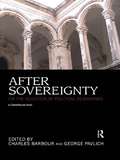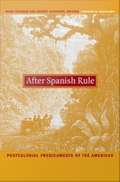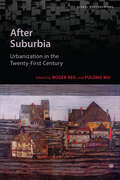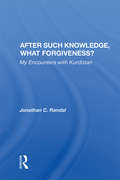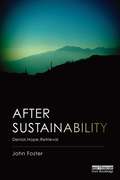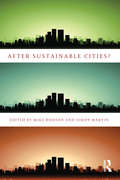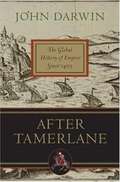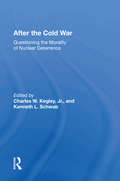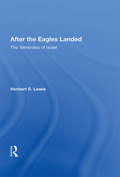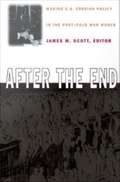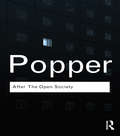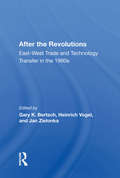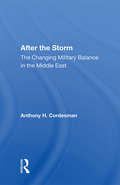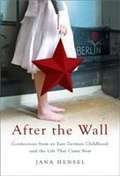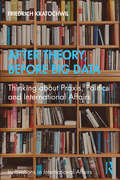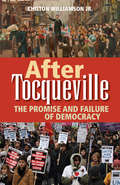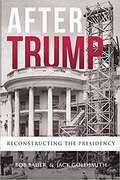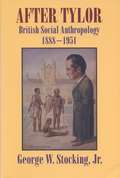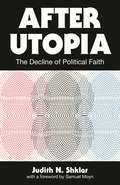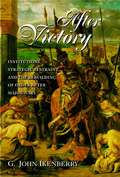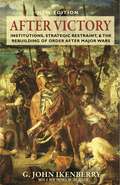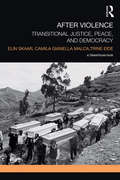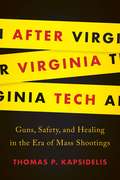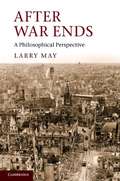- Table View
- List View
After Sovereignty: On the Question of Political Beginnings
by Charles Barbour George PavlichAfter Sovereignty addresses the vexed question of sovereignty in contemporary social, political, and legal theory. The emergence, and now apparent implosion, of international capital exceeding the borders of known political entities, the continued expansion of a potentially endless 'War on Terror', the often predicted, but still uncertain, establishment of either a new international American Empire or a new era of International Law, the proliferation of social and political struggles among stateless refugees, migrant workers, and partial citizens, the resurgence of religion as a dominant source of political identification among people all over the globe – these developments and others have thrown into crisis the modern concept of sovereignty, and the notions of statehood and citizenship that rest upon it. Drawing on classical sources and more contemporary speculations, and developing a range of arguments concerning the possibility of political beginnings in the current moment, the papers collected in After Sovereignty contribute to a renewed interest in the problem of sovereignty in theoretical and political debate. They also provide a multitude of resources for the urgent, if necessarily fractured and diffuse, effort to reconfigure sovereignty today. Whilst it has regularly been suggested that the sovereignty of the nation-state is in crisis, the exact reasons for, and exact implications of, this crisis have rarely been so intensively examined.
After Spanish Rule: Postcolonial Predicaments of the Americas
by Mark Thurner Andrés GuerreroInsisting on the critical value of Latin American histories for recasting theories of postcolonialism, After Spanish Rule is the first collection of essays by Latin Americanist historians and anthropologists to engage postcolonial debates from the perspective of the Americas. These essays extend and revise the insights of postcolonial studies in diverse Latin American contexts, ranging from the narratives of eighteenth-century travelers and clerics in the region to the status of indigenous intellectuals in present-day Colombia. The editors argue that the construction of an array of singular histories at the intersection of particular colonialisms and nationalisms must become the critical project of postcolonial history-writing. Challenging the universalizing tendencies of postcolonial theory as it has developed in the Anglophone academy, the contributors are attentive to the crucial ways in which the histories of Latin American countries--with their creole elites, hybrid middle classes, subordinated ethnic groups, and complicated historical relationships with Spain and the United States--differ from those of other former colonies in the southern hemisphere. Yet, while acknowledging such differences, the volume suggests a host of provocative, critical connections to colonial and postcolonial histories around the world. Contributors Thomas Abercrombie Shahid Amin Jorge Caizares-Esguerra Peter Guardino Andrs Guerrero Marixa Lasso Javier Morillo-Alicea Joanne Rappaport Mauricio Tenorio-Trillo Mark Thurner
After Suburbia: Urbanization in the Twenty-First Century (Global Suburbanisms)
by Roger Keil Fulong WuAfter Suburbia presents a cross-section of state-of-the-art scholarship in critical global suburban research and provides an in-depth study of the planet’s urban peripheries to grasp the forms of urbanization in the twenty-first century. Based on cutting-edge conceptual thought and steeped in richly detailed empirical work conducted over the past decade, After Suburbia draws on research from Asia, Africa, Australia, Europe, and the Americas to showcase comprehensive global scholarship on the urban periphery. Contributors explicitly reject the traditional centre-periphery dichotomy and the prioritization of epistemologies that favour the Global North, especially North American cases, over other experiences. In doing so, the book strongly advances the notion of a post-suburban reality in which traditional dynamics of urban extension outward from the centre are replaced by a set of complex contradictory developments. After Suburbia examines multiple centralities and diverse peripheries which mesh to produce a surprisingly contradictory and diverse metropolitan landscape.
After Such Knowledge, What Forgiveness?: My Encounters With Kurdistan
by Jonathan C. RandalThis book is about the Kurds and Kurdistan, discussing Kurdish nationalist aspirations, the repeated Kurdish revolts, and the rogue chromosome in Kurdish genetics causes what Indians, with their love of fancy words, would call "fissiparous tendencies."
After Sustainability: Denial, Hope, Retrieval
by John FosterDangerous climate change is coming. Some people still deny that it is happening. Others refuse to recognise that it is now too late to prevent it. But both these reactions spring from the same source: our pathological attachment to ‘progress’, of which sustainability has been one more version. After Sustainability traces that attachment to its roots in the ways we make sense of ourselves. Original and accessible, this is philosophy on the edge, written for anyone who glimpses our environmental tragedy and cares about our future. Does the challenge to stop pretending offer our only remaining chance? Read this book and make up your own mind.
After Sustainable Cities?
by Simon Marvin Mike HodsonA sustainable city has been defined in many ways. Yet, the most common understanding is a vision of the city that is able to meet the needs of the present without compromising the ability of future generations to meet their own needs. Central to this vision are two ideas: cities should meet social needs, especially of the poor, and not exceed the ability of the global environment to meet needs.After Sustainable Cities critically reviews what has happened to these priorities and asks whether these social commitments have been abandoned in a period of austerity governance and climate change and replaced by a darker and unfair city. This book provides the first comprehensive and comparative analysis of the new eco-logics reshaping conventional sustainable cities discourse and environmental priorities of cities in both the global north and south. The dominant discourse on sustainable cities, with a commitment to intergenerational equity, social justice and global responsibility, has come under increasing pressure. Under conditions of global ecological change, international financial and economic crisis and austerity governance new eco-logics are entering the urban sustainability lexicon – climate change, green growth, smart growth, resilience and vulnerability, ecological security. This book explores how these new eco-logics reshape our understanding of equity, justice and global responsibility, and how these more technologically and economically driven themes resonate and dissonate with conventional sustainable cities discourse. This book provides a warning that a more technologically driven and narrowly constructed economic agenda is driving ecological policy and weakening previous commitment to social justice and equity. After Sustainable Cities brings together leading researchers to provide a critical examination of these new logics and identity what sort of city is now emerging, as well as consider the longer-term implication on sustainable cities research and policy.
After Tamerlane: The Global History Of Empire Since 1405
by John DarwinA Rise and Fall of the Great Powers for the post-Cold War era--a brilliantly written, sweeping new history of how empires have ebbed and flowed over the past six centuries. The death of the great Tatar emperor Tamerlane in 1405, writes historian John Darwin, was a turning point in world history. Never again would a single warlord, raiding across the steppes, be able to unite Eurasia under his rule. After Tamerlane, a series of huge, stable empires were founded and consolidated-- Chinese, Mughal, Persian, and Ottoman--realms of such grandeur, sophistication, and dynamism that they outclassed the fragmentary, quarrelsome nations of Europe in every respect. The nineteenth century saw these empires fall vulnerable to European conquest, creating an age of anarchy and exploitation, but this had largely ended by the twenty-first century, with new Chinese and Indian super-states and successful independent states in Turkey and Iran. This elegantly written, magisterial account challenges the conventional narrative of the "Rise of the West," showing that European ascendancy was neither foreordained nor a linear process. Indeed, it is likely to be a transitory phase. After Tamerlane is a vivid, bold, and innovative history of how empires rise and fall, from one of Britain's leading scholars. It will take its place beside other provocative works of "large history," from Paul Kennedy's The Rise and Fall of the Great Powers to David Landes's The Wealth and Poverty of Nations or Niall Ferguson's Empire.
After The Cold War: Questioning The Morality Of Nuclear Deterrence
by Charles KegleyThis is a text on the traditional questions of nuclear deterrence and the unconventional answers suggested by the emerging new world order. These widely-ranging essays by scholars, policymakers and moral philosophers present rival ideas about the morality of alternative means for preserving mutual security as the world moves beyond the Cold War.
After The Eagles Landed: The Yemenites Of Israel *now Available Thru Waveland Press *waveland Tel#-708-634-0081
by Herbert S. LewisThis book portrays aspects of the life of a community of over 1,200 Jews who were either born in Yemen, or who were, in 1975–77, the young sons and daughters of immigrants from Yemen. It contains implications for the important and currently debated topic of ethnic integration in Israel.
After The End: Making U.S. Foreign Policy in the Post-Cold War World
by James M. ScottIn the political landscape emerging from the end of the Cold War, making U. S. foreign policy has become more difficult, due in part to less clarity and consensus about threats and interests. In After the End James M. Scott brings together a group of scholars to explore the changing international situation since 1991 and to examine the characteristics and patterns of policy making that are emerging in response to a post-Cold War world. These essays examine the recent efforts of U. S. policymakers to recast the roles, interests, and purposes of the United States both at home and abroad in a political environment where policy making has become increasingly decentralized and democratized. The contributors suggest that foreign policy leadership has shifted from White House and executive branch dominance to an expanded group of actors that includes the president, Congress, the foreign policy bureaucracy, interest groups, the media, and the public. The volume includes case studies that focus on China, Russia, Bosnia, Somalia, democracy promotion, foreign aid, and NAFTA. Together, these chapters describe how policy making after 1991 compares to that of other periods and suggest how foreign policy will develop in the future. This collection provides a broad, balanced evaluation of U. S. foreign policy making in the post-Cold War setting for scholars, teachers, and students of U. S. foreign policy, political science, history, and international studies. Contributors. Ralph G. Carter, Richard Clark, A. Lane Crothers, I. M. Destler, Ole R. Holsti, Steven W. Hook, Christopher M. Jones, James M. McCormick, Jerel Rosati, Jeremy Rosner, John T. Rourke, Renee G. Scherlen, Peter J. Schraeder, James M. Scott, Jennifer Sterling-Folker, Rick Travis, Stephen Twing
After The Open Society: Selected Social and Political Writings
by Jeremy Shearmur Karl Popper Piers Norris TurnerIn this long-awaited volume, Jeremy Shearmur and Piers Norris Turner bring to light Popper's most important unpublished and uncollected writings from the time of The Open Society until his death in 1994.After The Open Society: Selected Social and Political Writings reveals the development of Popper's political and philosophical thought during and after the Second World War, from his early socialism through to the radical humanitarianism of The Open Society. The papers in this collection, many of which are available here for the first time, demonstrate the clarity and pertinence of Popper's thinking on such topics as religion, history, Plato and Aristotle, while revealing a lifetime of unwavering political commitment. After The Open Society illuminates the thought of one of the twentieth century's greatest philosophers and is essential reading for anyone interested in the recent course of philosophy, politics, history and society.
After The Revolutions: East-west Trade And Technology Transfer In The 1990s
by Jan Zielonka Gary K. Bertsch Heinrich VogelThis book presents various aspects of the changing nature of East-West relations and attempts to anticipate future trends in East-West trade and technology transfer, dealing with the evolution of national approaches towards trade and technology transfer.
After The Storm: The Changing Military Balance In The Middle East (History And Politics In The 20th Century: Bloomsbury Academic Ser.)
by Anthony H CordesmanThis comprehensive new analysis goes far beyond today's headlines and the basic facts and figures on the military forces in the region. Tracing the origin of the military forces in each Middle East country, Tony Cordesman discusses current security developments and provides a qualitative and quantitative analysis of the strength and effectiveness o
After The Wall: Confessions From An East German Childhood And The Life That Came Next
by Jefferson Chase Jana HenselJana Hensel was thirteen on November 9, 1989, the night the Berlin Wall fell. In all the euphoria over German reunification, no one stopped to think what it would mean for Jana and her generation of East Germans. These were the kids of the seventies, who had grown up in the shadow of Communism with all its hokey comforts: the Young Pioneer youth groups, the cheerful Communist propaganda, and the comforting knowledge that they lived in a Germany unblemished by an ugly Nazi past and a callouscapitalist future. Suddenly everything was gone. East Germany disappeared, swallowed up by the West, and in its place was everything Jana and her friends had coveted for so long: designer clothes, pop CDs, Hollywood movies, supermarkets, magazines. They snapped up every possible Western product and mannerism. They changed the way they talked, the way they walked, what they read, where they went. They cut off from their parents. They took English lessons, and opened bank accounts. Fifteen years later, they allhave the right haircuts and drive the right cars, but who are they? Where are they going? InAfter the Wall, Jana Hensel tells the story of her confused generation of East Germans, who were forced to abandon their past and feel their way through a foreign landscape to an uncertain future. Now as they look back, they wonder whether the oppressive, yet comforting life of their childhood wasn't so bad after all.
After Theory, Before Big Data: Thinking about Praxis, Politics and International Affairs (Innovations in International Affairs)
by Friedrich KratochwilThis book’s key purpose is to contribute to the ongoing "theoretical" discussion in the field of international relations (IR) concerning the status of grand theories. However, it also has a wider, critical mission: to challenge mainstream social science and its dominant methodology, as well as the unfettered optimism that the problem of social order can be solved by the "application" of scientific knowledge to our practical problems. The author uses rigorous philosophical analysis to focus on the unexamined assumptions that form the bedrock of many contemporary scholars in IR and demonstrates the unavailability of a universal "scientific" procedure for finding the facts, when we face practical choices and issues of social reproduction. This book will be of interest to upper-level students of IR, sociology, history, and philosophy of science; it will also speak to students of security, foreign policy making, migration, and political economy, in addressing the basis of their attitudes in thinking about the world and the role of scholarship.
After Tocqueville: The Promise and Failure of Democracy
by Chilton Williamson Jr.The End of Democracy? The fall of the Berlin Wall. The collapse of the Iron Curtain. The Orange Revolution. The Arab Spring.The rush of events in recent decades seems to confirm that Alexis de Tocqueville was right: the future belongs to democracy. But take a closer look. The history of democracy since the 1830s, when Tocqueville wrote Democracy in America, reveals a far more complicated picture. And the future, author Chilton Williamson Jr. demonstrates, appears rather unpromising for democratic institutions around the world.The fall of communism sparked the popular notion that the spread of democracy was inevitable. After Tocqueville challenges this sunny notion. Various aspects of twenty-first-century life that Tocqueville could scarcely have imagined—political, economic, social, religious, intellectual, technological, environmental—militate against democracy, both in developing societies and in the supposedly democratic West.This piercing, elegantly written book raises crucial questions about the future of democracy.
After Trump: Reconstructing The Presidency
by Jack Goldsmith Bob BauerIn After Trump: Reconstructing the Presidency, Bob Bauer and Jack Goldsmith provide a comprehensive roadmap for reform of the presidency in the post-Trump era.In fourteen chapters they offer more than fifty concrete proposals concerning presidential conflicts of interest, foreign influence on elections, pardon power abuse, assaults on the press, law enforcement independence, Special Counsel procedures, FBI investigations of presidents and presidential campaigns, the role of the White House Counsel, war powers, control of nuclear weapons, executive branch vacancies, domestic emergency powers, how one administration should examine possible crimes by the president of a prior administration, and more. <P><P>Each set of reform proposals is preceded by rich descriptions of relevant presidential history, and relevant background law and norms, that place the proposed reforms in context. All of the proposals are prefaced by a chapter that explains how Trump--and, in some cases, his predecessors--conducted the presidency in ways that justify these reforms.After Trump will thus be essential reading for the coming debate on how to reconstruct the laws and norms that constitute and govern the world’s most powerful office.It’s hard to imagine two better co-authors for the task. Both served in senior executive branch positions—in the administrations of Barack Obama and George W. Bush, respectively—and have written widely on the presidency.Bob Bauer served from 2010-2011 as White House Counsel to President Barack Obama, who in 2013 named Bauer to be Co-Chair of the Presidential Commission on Election Administration. He is a Professor of Practice and Distinguished Scholar in Residence at New York University School of Law, as well as the co-director of its Legislative and Regulatory Process Clinic.Jack Goldsmith served as Assistant Attorney General, Office of Legal Counsel from 2003-2004, and Special Counsel to the Department of Defense from 2002-2003. He is the Learned Hand Professor at Harvard Law School, co-founder of Lawfare, and a Senior Fellow at the Hoover Institution. Together, in this book, they set the terms for the national discussion to come about the presidency, its powers, and its limits.
After Tylor: British Social Anthropology, 1888-1951
by George W. StockingA sequel to Victorian Anthropology, Stocking's widely acclaimed study of British anthropology and the Darwinian Revolution, After Tylor is the first comprehensive exploration of the intellectual transition that gave rise to modern British social anthropology.
After Utopia: The Decline of Political Faith
by Judith N. ShklarA political philosophy classic from one of the foremost political thinkers of the twentieth centuryAfter Utopia was Judith Shklar’s first book, a harbinger of her renowned career in political philosophy. Throughout the many changes in political thought during the last half century, this important work has withstood the test of time. In After Utopia, Shklar explores the decline of political philosophy, from Enlightenment optimism to modern cultural despair, and she offers a critical, creative analysis of this downward trend. She looks at Romantic and Christian social thought, and she shows that while the present political fatalism may be unavoidable, the prophets of despair have failed to explain the world they so dislike, leaving the possibility of a new and vigorous political philosophy. With a foreword by Samuel Moyn, examining After Utopia’s continued relevance, this current edition introduces a remarkable synthesis of ideas to a new generation of readers.
After Victory: Institutions, Strategic Restraint, and the Rebuilding of Order After Major Wars
by G. John IkenberryThe end of the Cold War was a "big bang" reminiscent of earlier moments after major wars, such as the end of the Napoleonic Wars in 1815 and the end of the World Wars in 1919 and 1945. Here John Ikenberry asks the question, what do states that win wars do with their newfound power and how do they use it to build order? In examining the postwar settlements in modern history, he argues that powerful countries do seek to build stable and cooperative relations, but the type of order that emerges hinges on their ability to make commitments and restrain power.The author explains that only with the spread of democracy in the twentieth century and the innovative use of international institutions--both linked to the emergence of the United States as a world power--has order been created that goes beyond balance of power politics to exhibit "constitutional" characteristics. The open character of the American polity and a web of multilateral institutions allow the United States to exercise strategic restraint and establish stable relations among the industrial democracies despite rapid shifts and extreme disparities in power.Blending comparative politics with international relations, and history with theory, After Victory will be of interest to anyone concerned with the organization of world order, the role of institutions in world politics, and the lessons of past postwar settlements for today. It also speaks to today's debate over the ability of the United States to lead in an era of unipolar power.
After Victory: Institutions, Strategic Restraint, and the Rebuilding of Order after Major Wars, New Edition (Princeton Studies In International History And Politics Ser. #161)
by G. John IkenberryThe end of the Cold War was a "big bang" reminiscent of earlier moments after major wars, such as the end of the Napoleonic Wars in 1815 and the end of the world wars in 1919 and 1945. But what do states that win wars do with their newfound power, and how do they use it to build order? In After Victory, John Ikenberry examines postwar settlements in modern history, arguing that powerful countries do seek to build stable and cooperative relations, but the type of order that emerges hinges on their ability to make commitments and restrain power. He explains that only with the spread of democracy in the twentieth century and the innovative use of international institutions—both linked to the emergence of the United States as a world power—has order been created that goes beyond balance of power politics to exhibit "constitutional" characteristics. Blending comparative politics with international relations, and history with theory, After Victory will be of interest to anyone concerned with the organization of world order, the role of institutions in world politics, and the lessons of past postwar settlements for today.
After Victory: Institutions, Strategic Restraint, and the Rebuilding of Order after Major Wars, New Edition - New Edition (Princeton Studies in International History and Politics #161)
by G. John IkenberryThe end of the Cold War was a "big bang" reminiscent of earlier moments after major wars, such as the end of the Napoleonic Wars in 1815 and the end of the world wars in 1919 and 1945. But what do states that win wars do with their newfound power, and how do they use it to build order? In After Victory, John Ikenberry examines postwar settlements in modern history, arguing that powerful countries do seek to build stable and cooperative relations, but the type of order that emerges hinges on their ability to make commitments and restrain power. He explains that only with the spread of democracy in the twentieth century and the innovative use of international institutions—both linked to the emergence of the United States as a world power—has order been created that goes beyond balance of power politics to exhibit "constitutional" characteristics. Blending comparative politics with international relations, and history with theory, After Victory will be of interest to anyone concerned with the organization of world order, the role of institutions in world politics, and the lessons of past postwar settlements for today.
After Violence: Transitional Justice, Peace, and Democracy
by Elin Skaar Camila Gianella Malca Trine EideAfter Violence: Transitional Justice, Peace, and Democracy examines the effects of transitional justice on the development of peace and democracy. Anticipated contributions of transitional justice mechanisms are commonly stated in universal terms, with little regard for historically specific contexts. Yet a truth commission, for example, will not have the same function in a society torn by long-term civil war or genocide as in a society emerging from authoritarian repression. Addressing trials, reparations, truth commissions, and amnesties, the book systematically addresses the experiences of four very different contemporary transitional justice cases: post-authoritarian Uruguay and Peru and post-conflict Rwanda and Angola. Its analysis demonstrates that context is a crucial determinant of the impact of transitional justice processes, and identifies specific contextual obstacles and limitations to these processes. The book will be of much interest to scholars in the fields of transitional justice and peacebuilding, as well as students generally concerned with human rights and democratisation.
After Virginia Tech: Guns, Safety, and Healing in the Era of Mass Shootings
by Thomas P. KapsidelisIn what has become the era of the mass shooting, we are routinely taken to scenes of terrible violence. Often neglected, however, is the long aftermath, including the efforts to effect change in the wake of such tragedies. On April 16, 2007, thirty-two Virginia Tech students and professors were murdered. Then the nation’s deadliest mass shooting by a lone gunman, the tragedy sparked an international debate on gun culture in the United States and safety on college campuses. Experiencing profound grief and trauma, and struggling to heal both physically and emotionally, many of the survivors from Virginia Tech and their supporters put themselves on the front lines to advocate for change. Yet since that April, large-scale gun violence has continued at a horrifying pace.In After Virginia Tech, award-winning journalist Thomas Kapsidelis examines the decade after the Virginia Tech massacre through the experiences of survivors and community members who have advocated for reforms in gun safety, campus security, trauma recovery, and mental health. Undaunted by the expansion of gun rights, they have continued their national leadership despite an often-hostile political environment and repeated mass violence. Kapsidelis also focuses on the trauma suffered by police who responded to the shootings, and the work by chaplains and a longtime police officer to create an organization dedicated to recovery. The stories Kapsidelis tells here show how people and communities affected by profound loss ultimately persevere long after the initial glare and attention inevitably fade. Reaching beyond policy implications, After Virginia Tech illuminates personal accounts of recovery and resilience that can offer a ray of hope to millions of Americans concerned about the consequences of gun violence.
After War Ends
by Larry MayThere is extensive discussion in current Just War literature about the normative principles which should govern the initiation of war (jus ad bellum) and also the conduct of war (jus in bello), but this is the first book to treat the important and difficult issue of justice after the end of war. Larry May examines the normative principles which should govern post-war practices such as reparations, restitution, reconciliation, retribution, rebuilding, proportionality and the Responsibility to Protect. He discusses the emerging international law literature on transitional justice and the problem of moving from a position of war and possible mass atrocity to a position of peace and reconciliation. He questions the Just War tradition, arguing that contingent pacifism is most in keeping with normative principles after war ends. His discussion is richly illustrated with contemporary examples and will be of interest to students of political and legal philosophy, law and military studies.
